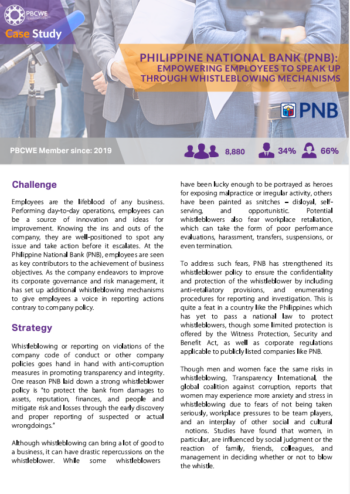01 July 2021 | Case Study
Empowering Employees to Speak Up Through Whistleblowing Mechanisms
Summary
This case study discusses how the Philippine National Bank (PNB) has strengthened its whistleblower policy, promoting gender equality, ensuring protection and fairness for all employees in reporting misconduct. This policy plays a big role in ensuring that employees regardless of rank or gender, to speak up without fear and report on violations of company policy. This revision aims to create an environment where all employees, particularly women, can safely report unethical behavior without fear of retaliation. Recognising the unique challenges women face in reporting issues due to societal and cultural pressures, PNB has introduced measures to protect identities and safeguard against any form of backlash. The policy includes confidential reporting channels, rigorous investigation processes, and clear anti-retaliation provisions. Moreover, the bank has implemented educational campaigns to raise awareness about the importance of reporting and the protections in place for whistleblowers, aiming to empower employees and promote a culture of transparency and integrity. This proactive approach underscores PNB’s commitment to upholding high ethical standards and supporting gender equality as integral to its corporate governance framework.
This case study was originally published on the PBCWE website.
Highlights
- PNB’s whistleblower policy revision specifically addresses gender-related concerns, ensuring women feel secure and valued when reporting workplace issues.
- Enhanced confidentiality measures and anti-retaliation protections encourage more women to come forward with their concerns, supporting an ethical workplace culture.
- The bank’s training and awareness initiatives help demystify the reporting process and reinforce the importance of everyone’s role in maintaining ethical standards.
- The policy has led to an increase in reports filed, reflecting growing trust in the system and greater employee engagement in promoting workplace integrity.
- PNB’s focus on gender sensitivity in its whistleblower policy is part of its broader commitment to gender equality and women’s economic empowerment in the corporate sector.

Published by: Investing in Women, PBCWE
View other Resources
Commitment to a safe, engaged, and inclusive workplace at Aboitiz Equity Ventures
This case study examines Aboitiz Equity Ventures’s efforts towards improving workplace gender equality through engaging with PBCWE and GEARS.
Advancing Workplace Gender Equality at Teleperformance Philippines
This case study examines how Teleperformance Philippines improved workplace gender equality by engaging with PBCWE and adopting GEARS recommendations.
Sustaining an inclusive culture for women at DDB Group Philippines
This case study demonstrates how DDB Group Philippines sustained an inclusive culture and how companies can adopt similar initiatives.

